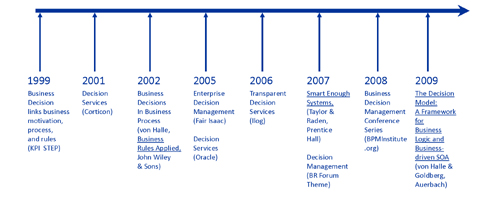Happy New Year. I think.
2009 opens with the most ominous, and the most hopeful of portents. With the global economy in its deepest dive since the great depression we are holding our collective breath in the hope that the government can steer us away from a calamity such as was experienced in that terrible era. At the same time we welcome an historic new U.S. President, and wish him (and us) success, whatever our political stripe.
For Business Decision Management this will also be an important, if not decisive year. In 2007 Addison-Wesley published the seminal book by James Taylor and Neil Raden, Smart {Enough} Systems. In this book, there appeared the Smart Enough System Manifesto which said, in part:
- Operational decisions are important
o Organizations are perceived through the lens of the decisions they make.
o Lots of small decisions add up.
o All decisions an organization makes should be managed as though they are deliberate. - Operational decisions can and should be automated
o High-volume, operational decisions can and should be automated.
o Traditional technology approaches won’t succeed in automating decisions.
o The overall effectiveness of automated decisions must be measured, tracked, and improved over time. - Taking control of operational decisions is increasingly a source of competitive advantage
This manifesto provides a clear and clarion call for what we call “Business Decision Management”, and provides a compelling business reason for this important discipline (Taylor and Raden called it Enterprise Decision Management, but we prefer the Business moniker. It’s the same thing.) The book provided, for the first time, a comprehensive business and technical framework for the automation and management of Business Decisions as separate and valuable business assets.
The book was timely, marking the end of the “Business Rules” era. This was ushered in at the end of the 1990s with the Business Rules Manifesto, which focused on separating and managing business rules. From the moment that Smart {Enough} System was published, Business Rules became, from the point of view of the business, merely components of a larger, more pertinent issue, the Business Decision.
Figure 1: The History of The Business Decision as a Discipline (click image for larger view)
The Business Decision is something that the business can recognize, and relate to operations and objectives. It has a granularity that is manageable, and has an impact on operations that is easily measured and tracked. It is a grouping of Business Rules that makes the most sense from the business perspective. Managing a catalog 500, 1000, 10,000 or 20,000 Business Rules (and often many more) has proved to be a daunting, if not overwhelming task for the business. Some have questioned the value, given the effort. However, managing Business Decisions enables the business to prioritize the Business Rules by their importance, simplifying and adding value to the process.
2008 was a year when the early work in BDM began to mature, practitioners began to experience the impact of BDM. During the course of 2009 we will begin to read and hear about the outcomes of projects, and experience in the field. The BDM Bulletin plans several of these articles this year.
Also to come in 2009 is the book on a “The Decision Model: A Framework for Business Logic and Business Driven SOA”, to be published by Auerbach in the spring. Barbara von Halle and I have been working at this book for almost two years now, and have finally handed the manuscript to the editor. The book describes our new theory of business logic which we have called the Decision Model. This model is based upon the inherent structure of the business logic within the Business Decision. John Zachman once said “It occurs to me that once the underlying structure of a discipline is discovered, friction goes to zero! The processes (methodologies) become predictable and repeatable.” It is our hope that the Decision Model theory will help bring friction to zero; our early experiences have been very promising . We plan to publish excerpts from the book in the pages of this journal several times during 2009.
Several of the frequent contributors to the BDM Bulletin were also guest contributors to the book, including Brian Stucky, James Taylor, Dave Pedersen, Daniel Worden. Other guest contributors included longtime BPMInstitute.org stalwarts such as Bruce Silver and Mike Rosen. The preface was written by Ken Orr, and other contributors included John Zachman, Dave Haslett and Tracey Matthias.
Another development we can anticipate in 2009 is the emergence of Business Decision oriented software. We have recently seen several exciting developments on this front, which will be important if this is indeed going to be a year of breakthrough. Again, we will feature, in BDM articles, reviews of the emerging software, just as soon as the vendors release it into our hot little hands.
So, please participate in this important year with us. Let us have your comments and criticisms, as well as reports from the field. And good luck with your own Business Decision projects.


















